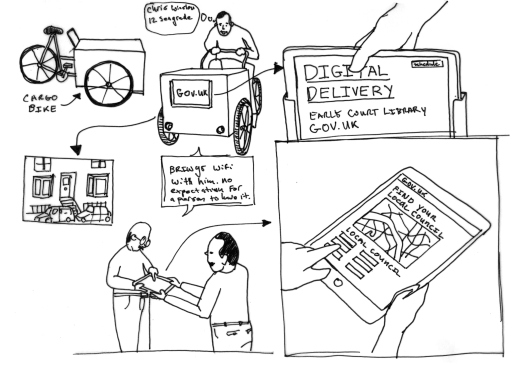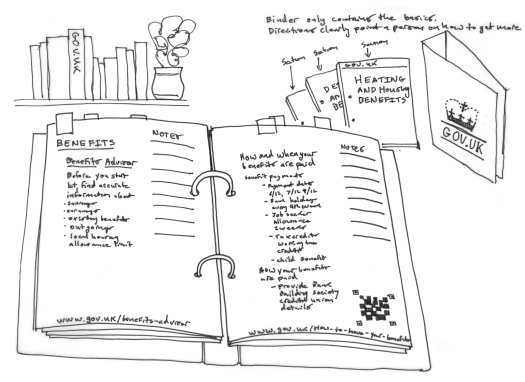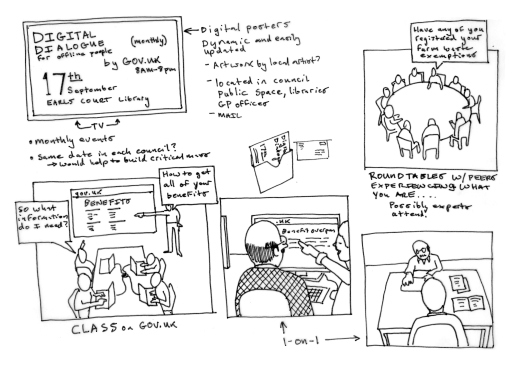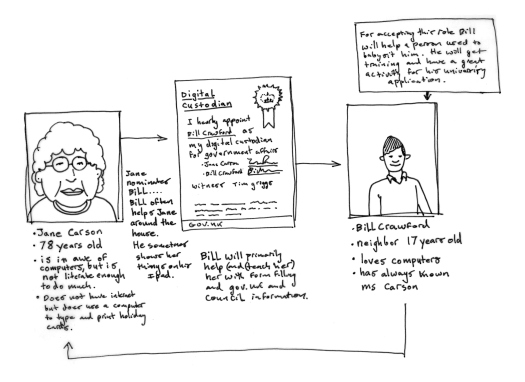Over the past two weeks, the assisted digital project with the Helen Hamlyn Centre for Design has evolved from understanding the reasons that older people are either not online at all or are only partially online, to developing ideas for potential design solutions.
I have been exploring how assisted digital support can meet the needs of older people with users at the Age UK Hackney computer centre and at New Horizons community centre in Chelsea. Though ‘older people’ is often defined as those aged 65 and over, I use a broader definition of the term, including people aged 50 and over in my research, who span middle and older ages. (This does make a difference to Internet use, GDS’ Digital Landscape Research shows that 30% of those aged 55-64 are offline, while 41% of those aged 65 and over are offline.)
My user research sessions serve two primary aims:
- uncover technical or cultural problems
- test possible solutions to these problems
Common problems
Through my research, I have been building on the initial findings of the project to identify some common problems faced by older people when attempting to complete digital transactions. One of the earliest findings was that many of the older people I spoke to who were online were more comfortable conducting a one-way search query than a two-way personal information transaction. Further research has revealed that the lack of confidence underlying these users’ reluctance to make a two-way transaction often results in increased user error when they do attempt transactions.
The older people I’ve been researching with seem to be facing four common problems:
- Some still do not trust the Internet enough to make digital transactions.
- Many often do not trust themselves enough to complete a transaction online without error.
- A lack of independence is associated with not being online.
- Many lack access to the Internet - this affects both those who are technologically curious and those who do not want to use the Internet.
Potential design solutions
So far the research has revealed three opportunity areas for the design of assisted digital support:
- User at home - technology enables the user to connect, from their own home, to a real person who will assist in completing a digital transaction.
- User travels to another location - where they can access digital equipment, experts and peers who will help them to transact online.
- An expert comes to the user - and brings their own Internet equipped computer or tablet, which they can use when helping the user to complete a digital transaction.
I have used these to underpin my ideas for potential design solutions to address the problems older people face. I presented four of these ideas to colleagues at GDS last week, these are shared below as diagrams, with descriptions of how they could work.
A disclaimer: at this stage, these ideas are still very much works in progress, and they are not the plans of GDS. Some may be more or less appropriate to explore further as design solutions that could potentially feed into future assisted digital support.
- Digital bike delivery

Every council in the UK has at least one library. This scenario builds on existing book delivery services that libraries already provide, and adds in a person who can provide Internet access and expertise or serve as a friendly link to digital government services for those who do not have access themselves. The messenger would be equipped with an Wifi enabled tablet or laptop to complete any digital transaction needed while also delivering and picking up books to return.
In the urban environment the service could be provided by a bike messenger on a cargo bike that would use a tablet for their list of deliveries with GPS that draws a clear map from one person’s home to the next.
- Printed GOV.UK site

The research workshops are often group discussions and often those discussions turn into impromptu brainstorms with the people that would use the service most.
This idea was first a question that inspired a discussion about how a physical book could provide a guide to the GOV.UK website. A place for notes in the margins of the book could enable an analogue entry point into a digital interaction, by serving as a signpost to the website. The book would have the same layout and feel as the GOV.UK site itself, and could be used as both a guide and an informal training tool.
- Digital Dialogues

Digital Dialogues would be a regionally-based event, held once a month at each library. These would be drop-in sessions where people could sit in groups and be trained on how to navigate the GOV.UK website and have a discussion about it. The event would be a live forum for users and a way of getting live feedback on GOV.UK, where people could describe their needs to their peers. One-to-one sessions would support people on specific tasks, using the equipment provided by the library.
This sort of event would be a positive way for people to socialise with their peers and meet other people in the community who might have similar needs or aspirations. The best teaching is often done by peers; this sort of serendipity would be supported by an event like this.
- Digital custodian

This is an idea based on a real example of something that is already happening in communities. This image shows Jane Carson who used to babysit for her next door neighbor Bill (names have been changed). Bill is now 17 and is skilled and confident with using the Internet. He is an early adopter of digital services, while Jane is a late adopter, and he helps Jane with anything Internet related.
This particular idea formalises and lightly incentivises this relationship. Bill would officially sign up as a ‘digital custodian’ for Jane, who already puts her trust in Bill’s online expertise. Bill would then simply walk next door to help Jane complete digital government transactions, and could even transact on her behalf when required.
Next steps
In the coming weeks, I want to make the research more focused, looking at some specific interactions involved in completing a transaction on GOV.UK. These could include registering or logging into a service, submitting an application, making a payment, and maintaining or updating personal information.
This research will be conducted at events in the triborough libraries, a consortium of libraries in Kensington & Chelsea, Hammersmith & Fulham, and Westminster which shares and links activities. I am currently working with Sue Cornish, the adult learning co-ordinator for these libraries, to advertise and organise sessions with older people who are just beginning to explore the possibilities opened up by being online.
I will aim to talk to a diverse group of users with diverse interests, to identify the specific problems faced around the above interactions. I will then work on designing, testing and refining design solutions to these problems, and will continue blogging about my findings and ideas.


9 comments
Comment by Simon Redding posted on
Some great ideas here. I volunteer as chairperson at a community centre where we run FREE volunteer run basics and transaction IT classes without funding. However, people won't transact in those education settings so we're now looking at a "Digital Club" where people can socialise and ask for help from their peers or supportive volunteers. Transactions that need to be made can be parked until the next Digital Club and dealt with once a week with some emotional, confidence & technical support.
Comment by lenand posted on
Here's a link to a St George's House Consultation with some more research evidence about the digital disengagement of people as they grow older. http://wp.me/p14MGf-y5. It also refers to some of the successful processes that help to reverse it.
Comment by Alan Rider posted on
Hi Peter
Really interesting bit of research which aptly illustrates that Assisted Digital is all about taking an 'analogue' approach to solve digital problems. Paper will be with us for years yet, as evidenced by the continued demand for print magazines and newspapers (just look at the huge popularity of Metro) so yes, lets use it as a gateway into digital to help address the perception of some users that they can't 'do' digital. I like the idea of a digital custodian (or buddy if you like) too. Many of us are informal versions of these already, helping out parents, grandparents and others to use online services. Ensuring these are trusted and secure is a big issue of course. All fascinating stuff and love the cartoons!
Comment by Doug bell posted on
Very interested in this work and how it evolves. Single Tier Pension will be
delivered in April 2016 with a digital offering so any feedback with regards
assiting the digital service is welcomed.
Comment by Liz Hughes posted on
very interested in the whole subject - we represent older people & champion their cause in the world of tax & HMRC & I am assigned to this area of work to ensure their voice is heard & they are not left behind (or outside) when digital is progressed
Comment by Mairi posted on
Interesting ideas. I too will be interested to see how they can be applied in rural areas - and eventually using other settings than libraries in both rural and urban situations, as lots of people never go near a library, unfortunately
Comment by lenand posted on
The user interface and interaction design is critical for success with older people. Too many sites face people with a random layout of things to do - they are not analogues of a paper input forms. That's what people know and understand - a simple sequence of things to do. Give them a design that does what they understand, before leading them gently into more efficient ways of interacting. Look at how Google grew with a home page that only does one thing.
Comment by julian Bowrey posted on
Peter
This looks a really interesting piece of work and libraries are a really good place to start as they have pretty much nationwide coverage, often excellent IT facilities, trained staff and are heavily used by older people. Will be interesting to see how this plays in more rural areas as well as central London - happy to help if you need any contacts
Comment by Seth Edwards, Strategic Systems and Technology Lead posted on
These are great ideas and I think that working all or some of them into deliverable solutions would be a really exciting challenge. Good luck and if you want any help with their development please get in touch as I'd love to be involved.
Seth